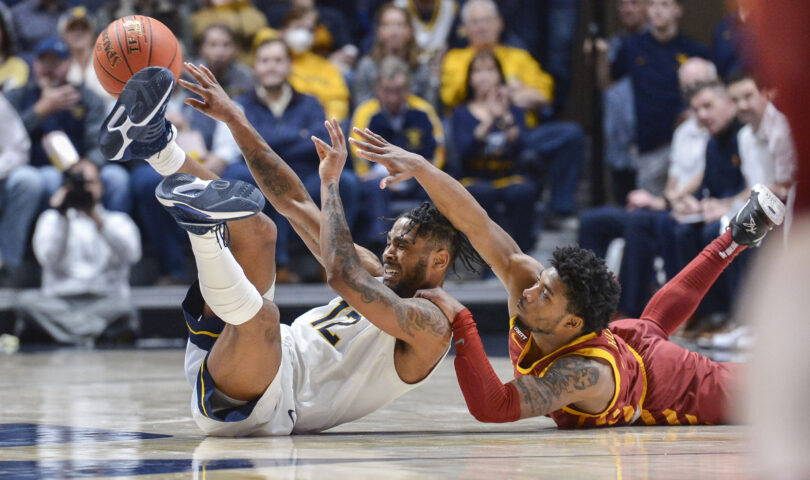Taz Sherman officially ended West Virginia’s seven-game losing streak Tuesday night.
Not with his 16 points, eight rebounds and six assists that went along with the Mountaineers’ 79-63 victory against Iowa State in front of 11,191 inside the WVU Coliseum, but that all surely helped.
Rather he did it with his words.
“This is the last time we’re talking about the streak now that it’s over,” the senior guard said in the postgame press conference while looking at teammates Jalen Bridges and Malik Curry.
That is what a senior leader is supposed to do. Taking charge goes further than just the 40 minutes on the court.
It’s what a leader says after a game or while hanging out after practice or in study hall or, well, you get the picture.
Minutes later, Sherman’s words rang even louder than simply putting an end to a losing streak.
“Once we do turn this around, I feel like we’re going to shock a whole lot of people,” he said. “It’s going to shock everyone. We know what we can do. The coaching staff knows what we can do. In terms of the world, we’re going to shock the world with what we do.”
If it happens, it may be one of the greatest stories ever written about a WVU basketball program.
But, before you can shock the world, you must first stink it up, which is a part of what the losing streak was about.
There is also a more personal side to it. Sherman went through the pains of getting his strength back after dealing with COVID-19 and then a concussion during the streak.
Players dealt with it off the court every day and then had to be reminded about it in practice.
The personal life of a losing streak, as the WVU players learned over the past month, goes well beyond the final score of each game.
“Honestly, the hardest thing was going back after each game and getting on my phone and seeing the texts from my dad,” Bridges said. “That was the worst part, I’m not going to lie.”
What was said in those text messages?
“You all got to pick it up and you all got some things to fix,” Bridges said. “That’s not exactly what was said, but I had to keep it PG.”
So many times the effort was there, but the results were not. Other times, the Mountaineers were simply made to look very bad, whether it was a lack of rebounding or making close shots.
One turned into two; two into three, and in the beginning, it could be passed off as playing really good teams from a really good Big 12 Conference, but you can’t pass off all seven losses to that excuse.
Sooner or later, this team had to look itself in the mirror and ask, “Are we really that bad?”
“We can finally smile now and be happy,” Curry said. “I don’t think anyone on our team has ever lost seven in a row before. It became a mental thing we were going through, honestly. Every day in practice, we just had to keep thinking about the next one we had to get.”
Is West Virginia (14-9, 3-7 Big 12) that bad? Obviously not, going by Tuesday’s results, but even that should be kept in perspective.
Iowa State, while ranked No. 8 in the country earlier this season, is now the team at the bottom of the Big 12 standings. That’s who WVU beat, the last-place team.
There is still much work to be done. Sherman must stay healthy and continue to play at a high level. The defense must keep playing well and passing the ball on offense has to become more consistent like it was against the Cyclones (16-8, 3-6).
Then, and only then, will the Mountaineers find themselves with an opportunity to write a good story.
Or, as Sherman said, then WVU can shock the world.
“I wish I shared that exuberance,” WVU head coach Bob Huggins said. “We’ve got two really hard road games coming up. It’s not going to be easy.”




